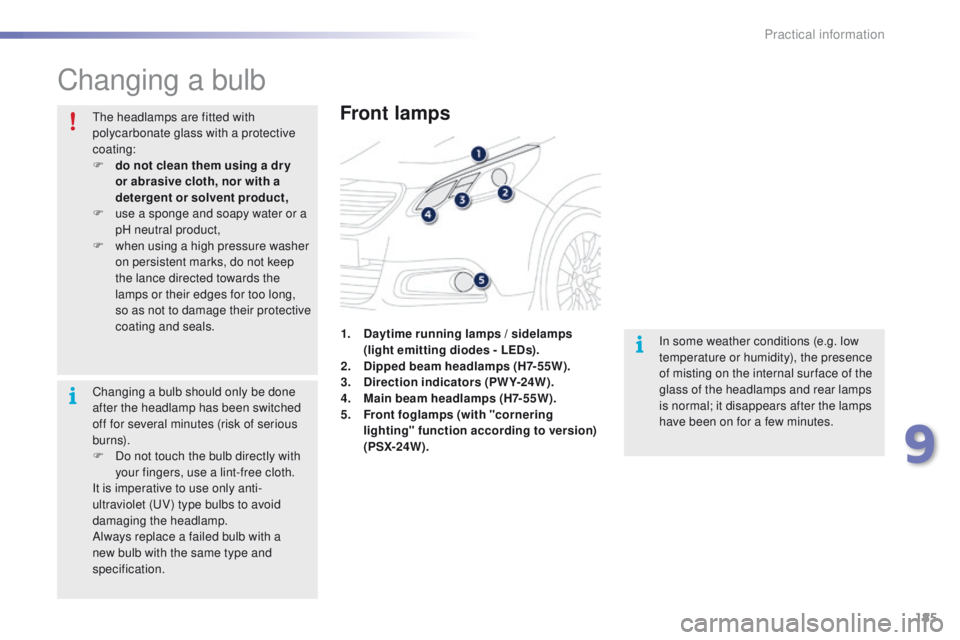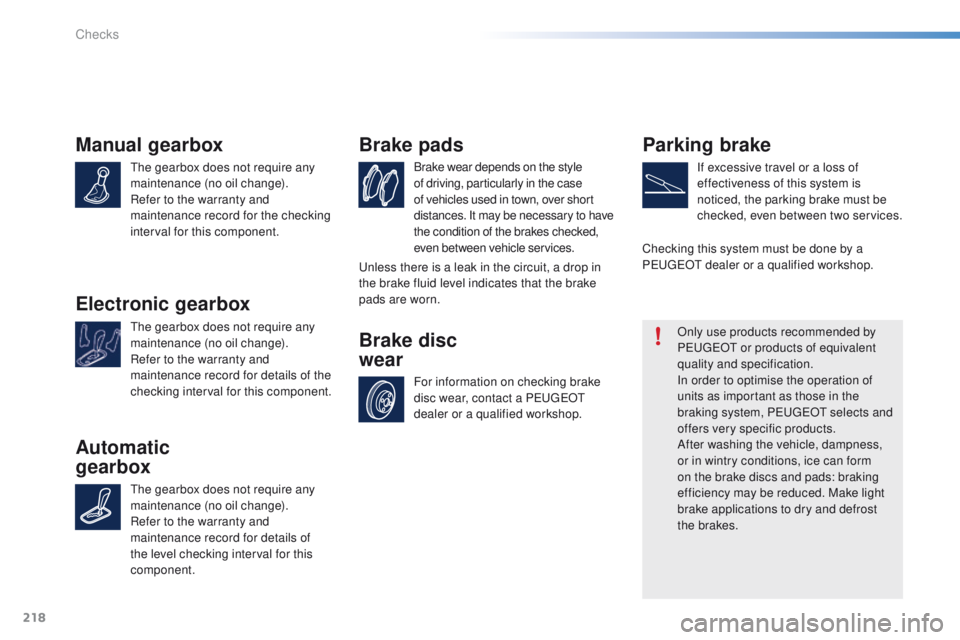Page 187 of 340

185
2008_en_Chap09_info-pratiques_ed01-2015
Changing a bulb
Front lamps
In some weather conditions (e.g. low
temperature or humidity), the presence
of misting on the internal sur face of the
glass of the headlamps and rear lamps
is normal; it disappears after the lamps
have been on for a few minutes.
The headlamps are fitted with
polycarbonate glass with a protective
coating:
F
d
o not clean them using a dr y
or abrasive cloth, nor with a
detergent or solvent product,
F
u
se a sponge and soapy water or a
pH neutral product,
F
w
hen using a high pressure washer
on persistent marks, do not keep
the lance directed towards the
lamps or their edges for too long,
so as not to damage their protective
coating and seals. 1. D
aytime running lamps / sidelamps
(light emitting diodes - LEDs).
2.
D
ipped beam headlamps (H7-55W).
3.
D
irection indicators (PWY-24W).
4.
M
ain beam headlamps (H7-55W).
5.
F
ront foglamps (with "cornering
lighting" function according to version)
(PSX-24W).
Changing a bulb should only be done
after the headlamp has been switched
off for several minutes (risk of serious
burns).
F
D
o not touch the bulb directly with
your fingers, use a lint-free cloth.
It is imperative to use only anti-
ultraviolet (UV) type bulbs to avoid
damaging the headlamp.
Always replace a failed bulb with a
new bulb with the same type and
specification.
9
Practical information
Page 189 of 340
187
2008_en_Chap09_info-pratiques_ed01-2015
Changing main beam headlamp bulbsDaytime running lamps /
sidelamps (light-emitting
diodes - LEDs)
For the replacement of this type of LED lamp,
contact a PEUGEOT dealer or a qualified
workshop.
To reassemble, carry out these operations in
reverse order, positioning the alignment lug at
the bottom.
F
R
emove the protective cover by pulling on
the tab.
F
D
isconnect the bulb connector.
F
P
ull out the bulb and replace it.
9
Practical information
Page 191 of 340
189
2008_en_Chap09_info-pratiques_ed01-2015
1. Brake lamps (P21W).
2. Sidelamps (light emitting
diodes - LEDs).
3.
D
irection indicators (PY21W amber).
Rear lamps
Light emitting diodes-LEDs
For replacement, contact a PEUGEOT
dealer or qualified workshop.
4.
F
oglamp (P21W).
5. R
eversing lamp (P21W).
9
Practical information
Page 193 of 340
191
2008_en_Chap09_info-pratiques_ed01-2015
Changing the third brake lamp
(light emitting diodes - LEDs)
Contact a PEUGEOT dealer or a qualified
workshop.
Number plate lamps
To facilitate the removal of the lamp, carry out
this operation with the tailgate half open.
F
I
nsert a thin screwdriver into the lens
cutout.
F
P
ush it outwards.
F
R
emove the lens.
F
C
hange the faulty bulb.
To refit, press on the lens to clip it in place. Access is by passing a hand under the bumper.
F
T urn the bulb holder an eighth of a turn and
pull it out.
F
C
hange the failed bulb.
To refit, carry out these operations in reverse
o r d e r.
Changing a foglamp or reversing
lamp bulb
On the left hand side, take care to not
touch the exhaust silencer; risk of burns
if changing a bulb after stopping the
engine.
9
Practical information
Page 207 of 340
205
2008_en_Chap09_info-pratiques_ed01-2015
Towing a trailer
We recommend the use of genuine
PEUGEOT towbars and their harnesses
that have been tested and approved
from the design stage of your vehicle,
and that the fitting of the towbar is
entrusted to a PEUGEOT dealer or a
qualified workshop.
If the towbar is not fitted by a
PEUGEOT dealer, it is imperative that it
is fitted in accordance with the vehicle
manufacturer's instructions.
Towbar suitable for the attachment of a
trailer or installation of a bicycle carrier, with
additional lighting and signalling.
Driving with a trailer places greater
demands on the towing vehicle and the
driver must take particular care.
Your vehicle is primarily designed for
transporting people and luggage, but it may
also be used for towing a trailer.
9
Practical information
Page 208 of 340

206
2008_en_Chap09_info-pratiques_ed01-2015
Driving advice
Distribution of loads
F Distribute the load in the trailer so that the heaviest items are as close as possible to
the axle and the nose weight approaches
the maximum permitted without
exceeding
it.
Air density decreases with altitude, thus
reducing engine performance. Above
1
000 metres, the maximum towed load must
be reduced by 10
% for every 1 000 metres of
altitude.
Side wind
F Take into account the increased sensitivity to side wind.
Cooling
Towing a trailer on a slope increases the
temperature of the coolant.
As the fan is electrically controlled, its cooling
capacity is not dependent on the engine speed.
F
T
o lower the engine speed, reduce your
speed.
The maximum towed load on a long incline
depends on the gradient and the ambient
temperature.
In all cases, keep a check on the coolant
temperature.
F
I
f the warning lamp and
the
STOP warning lamp come
on, stop the vehicle and switch
off the engine as soon as
possible.
Braking
Towing a trailer increases the braking distance.
To avoid overheating of the brakes on a long
mountain type of descent, the use of engine
braking is recommended.
Ty r e s
F Check the tyre pressures of the towing vehicle and of the trailer, observing the
recommended pressures.
Lighting
F Check the electrical lighting and signalling on the trailer.
The rear parking sensors will be
deactivated automatically if a genuine
PEUGEOT towbar is used.
Refer to the "Technical data" section for details
of the weights and towed loads which apply to
your vehicle.
Practical information
Page 210 of 340

208
2008_en_Chap09_info-pratiques_ed01-2015
Accessories
A wide range of accessories and genuine parts is available from the PEUGEOT dealer network.
These accessories and parts are all suitable for your vehicle and benefit from PEUGEOT's
recommendation and warranty.
Conversion kits
You can obtain an "Enterprise" kit to convert a
private car into a trade vehicle.
"Comfort":
door deflectors, side blinds and rear blind,
cigarette lighter, boot dividers, coat hanger
fixed to head restraint, front and rear parking
sensors...
"Transport solutions":
boot liner, luggage net, roof bars, bicycle
carrier on roof bars, ski carrier, roof box,
towbars....*
T
o avoid any risk of jamming of the pedals:
-
e
nsure that the mat is positioned and
secured correctly,
-
n
ever fit one mat on top of another.
"Styling":
gear lever knob, spoiler, styling strips, alloy
wheels, trims, chromed mirror shells, mirror
personalisation kits, wheel caps and exterior
stickers.....
"Security":
anti-theft alarm, window engraving, wheel
security bolts, child seats and booster
cushions, breathalyzer, first aid kit, warning
triangle, high visibility jacket, stolen vehicle
tracking system, temporary puncture repair kit,
snow chains, non-slip covers, front foglamps
kit, dog guard...
"Protection":
mats*, seat covers compatible with lateral
airbags, mud flaps, door sill protectors, bumper
protection strips, aluminium foot rest...
The towbar must be fitted by a
PEUGEOT dealer or a qualified
workshop.
Practical information
Page 220 of 340

218
2008_en_Chap10_verifications_ed01-2015
Manual gearbox
The gearbox does not require any
maintenance (no oil change).
Refer to the warranty and
maintenance record for the checking
interval for this component.
Electronic gearbox
The gearbox does not require any
maintenance (no oil change).
Refer to the warranty and
maintenance record for details of the
checking interval for this component.
Automatic
gearbox
The gearbox does not require any
maintenance (no oil change).
Refer to the warranty and
maintenance record for details of
the level checking interval for this
component.Brake wear depends on the style
of driving, particularly in the case
of vehicles used in town, over short
distances. It may be necessary to have
the condition of the brakes checked,
even between vehicle services.
Brake pads
For information on checking brake
disc wear, contact a PEUGEOT
dealer or a qualified workshop.
Brake disc
wear
Parking brake
If excessive travel or a loss of
effectiveness of this system is
noticed, the parking brake must be
checked, even between two services.
Only use products recommended by
PEUGEOT or products of equivalent
quality and specification.
In order to optimise the operation of
units as important as those in the
braking system, PEUGEOT selects and
offers very specific products.
After washing the vehicle, dampness,
or in wintry conditions, ice can form
on the brake discs and pads: braking
efficiency may be reduced. Make light
brake applications to dry and defrost
the brakes.
Checking this system must be done by a
PEUGEOT dealer or a qualified workshop.
Unless there is a leak in the circuit, a drop in
the brake fluid level indicates that the brake
pads are worn.
Checks